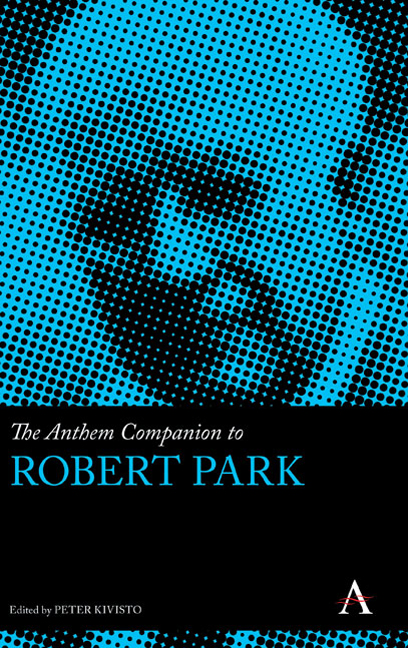Book contents
- Frontmatter
- Contents
- Introduction: The Legacy of Robert Ezra Park
- Chapter 1 A Twisted Path: Park, Gender and Praxis
- Chapter 2 Robert Park's Journey into Sociology
- Chapter 3 Beyond “Get the Seat of Your Pants Dirty in Real Research”: Park on Methods
- Chapter 4 The Basic Components of Social Action: Mead versus Park
- Chapter 5 Robert E. Park: Neglected Social Psychologist
- Chapter 6 Robert E. Park's Theory of Assimilation and Beyond
- Chapter 7 Robert Park's Marginal Man: The Career of a Concept in American Sociology
- Chapter 8 Marginality, Racial Politics and the Sociology of Knowledge: Robert Park and Critical Race Theory
- Chapter 9 The Cities of Robert Ezra Park: Toward a Periodization of His Conception of the Metropolis (1915–39)
- Chapter 10 The Impact of Robert E. Park on American Sociology of Religion
- Chronology
- Contributors
- Index
Introduction: The Legacy of Robert Ezra Park
Published online by Cambridge University Press: 10 January 2018
- Frontmatter
- Contents
- Introduction: The Legacy of Robert Ezra Park
- Chapter 1 A Twisted Path: Park, Gender and Praxis
- Chapter 2 Robert Park's Journey into Sociology
- Chapter 3 Beyond “Get the Seat of Your Pants Dirty in Real Research”: Park on Methods
- Chapter 4 The Basic Components of Social Action: Mead versus Park
- Chapter 5 Robert E. Park: Neglected Social Psychologist
- Chapter 6 Robert E. Park's Theory of Assimilation and Beyond
- Chapter 7 Robert Park's Marginal Man: The Career of a Concept in American Sociology
- Chapter 8 Marginality, Racial Politics and the Sociology of Knowledge: Robert Park and Critical Race Theory
- Chapter 9 The Cities of Robert Ezra Park: Toward a Periodization of His Conception of the Metropolis (1915–39)
- Chapter 10 The Impact of Robert E. Park on American Sociology of Religion
- Chronology
- Contributors
- Index
Summary
Edward Shils was uniquely positioned to assess the importance of Robert Ezra Park during the maturation period of American sociology insofar as he was both a student of Park and, less than two decades later, a collaborator with Talcott Parsons in producing Toward a General Theory of Action (1951). Thus, he had an insider's familiarity with both the Chicago school of sociology in its heyday and with Harvard University's Department of Social Relations during the era that it achieved hegemonic status in American sociology. His decision to enroll as a graduate student in sociology at the University of Chicago was predicated on what he had come to know about Park's writings, though he had never taken a sociology course before arriving at the Midway. And, as it turned out, he managed to take only one course from Park, it being the last course he would ever teach at Chicago before retiring (Shils 1991: 121).
During the 1990s, Shils would write not one, but two appreciative remembrances of Park. Summing up his understanding of Park's significance in the latter of these two works, he wrote, “I would insist that he was one of the great sociologists who, like Weber and Durkheim and Tönnies, still has an important place among those great sociologists of the past. With Durkheim, Park was the only sociologist who understood something about the nature of collective self- consciousness” (Shils 1996: 104).
In making these comparisons, Shils reminds us that Park was a contemporary of these scholars. Indeed, Park and Weber were born in the same year, 1864, the youngest of this group (Simmel, who Shils curiously does not mention, was born in 1858, the same year as Durkheim). This is worth observing because in some way Park seems to be closer to the present than his European counterparts. In part this can be explained by the fact that Durkheim, Simmel and Weber were all dead by 1920 and Tönnies was an emeritus professor by 1921, increasingly located on the margins of German university life as a consequence of his anti- fascist views. Meanwhile, Park lived until 1944, nearly to the end of World War II.
- Type
- Chapter
- Information
- The Anthem Companion to Robert Park , pp. 1 - 16Publisher: Anthem PressPrint publication year: 2017



